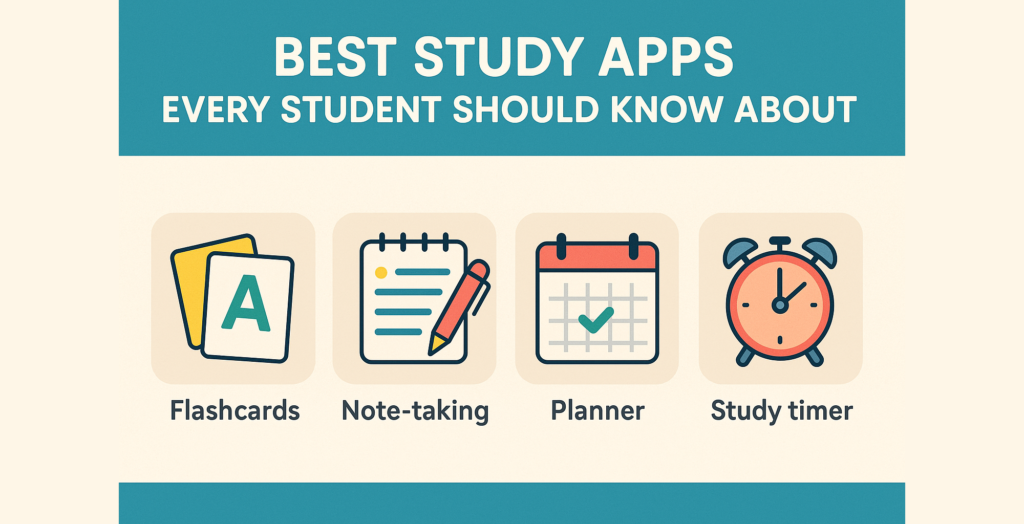Best Study Apps Every Student Should Know About
Studying doesn’t always mean sitting with heavy books or staring at pages of notes. These days, most students have a phone or laptop within reach, and let’s be honest, we all use them a lot. The good part is that your device can also become a smart study partner if you install the right apps. Some keep you organised, others push you to focus, and a few even make learning less boring.

I’ve put together a list of useful study apps that almost any student—whether you’re in middle school, high school, or college—can benefit from.
Why Do Study Apps Matter Anyway?
If you’ve ever missed a deadline, forgotten an assignment, or wasted two hours scrolling on social media when you meant to study… you’re not alone. These are things most students face every day. That’s where study apps step in.
Think of them as little helpers: they remind you of important tasks, keep your notes neat, and sometimes even stop you from checking Instagram when you should be revising. They don’t replace your effort, but they make studying smoother and a bit less stressful.
The Best Study Apps to Try
1. Google Keep
Google Keep is like a pocket diary, but digital. You can quickly note down ideas, make to-do lists, or even save voice memos if you don’t feel like typing. I like that you can colour-code notes, which makes things less messy. And because it’s linked to your Google account, you can open the same notes on your phone, laptop, or tablet.
2. Evernote
If your subjects involve loads of reading material, Evernote is worth a try. It lets you create digital notebooks where you can store PDFs, lecture slides, and even web pages you find helpful. Instead of scattering files across random folders, you can keep everything in one app.
3. Quizlet
Revision doesn’t always have to be boring. Quizlet lets you create flashcards, and you can test yourself with mini-games. For example, if you’re preparing for a biology exam, you can make flashcards with terms on one side and definitions on the other. Thousands of students share their flashcard sets, too, so you might even find what you need already prepared.
4. Forest
Here’s a fun one. Forest helps students who can’t resist checking their phones every five minutes. You “plant” a virtual tree when you want to focus. If you stay on task, the tree grows. If you leave to scroll social media, the tree dies. Over time, you end up with a forest that shows how well you’ve been focusing. Strange idea, but surprisingly motivating.
5. Grammarly
Writing assignments can be stressful—especially if you’re worried about grammar mistakes. Grammarly checks spelling, grammar, and even suggests better word choices. It’s like having a teacher proofread your essays instantly. And it works everywhere: emails, Google Docs, or even in your browser.
6. Microsoft OneNote
If you prefer something that feels like a real notebook, OneNote is handy. You can handwrite notes (great if you have a tablet), add images, or type long explanations. Plus, you can divide things into sections for each subject, just like physical notebooks.
7. Khan Academy
Sometimes teachers explain things too fast, or textbooks feel too heavy. That’s when Khan Academy helps. It offers free lessons in math, science, economics, and more. The short video lessons and practice questions are simple, and you can learn at your own pace.
8. Google Calendar
Deadlines creep up on all of us. Google Calendar keeps your schedule visible and reminds you before tests or project submissions. You can even colour-code—say, blue for school, red for personal stuff, and green for sports. Small trick, but it keeps life a lot less chaotic.
9. Duolingo
Want to pick up a new language? Duolingo makes it light and fun with bite-sized lessons. It feels more like playing a game than sitting in a language class. Whether it’s French, Spanish, or even a less common language, it keeps practice short but regular.
10. Notion
Notion is like a mix of all the above—notes, tasks, schedules, and project boards in one place. The best part is that you can customise it. Some students build detailed study dashboards with reading lists, exam countdowns, and even daily reflection pages. It takes a little time to set up, but once you get used to it, it feels like having a personal study assistant.
So, Which App Should You Start With?
Honestly, you don’t need them all. That just adds clutter. A good way to pick is by asking yourself:
-
Do I keep forgetting dates? → Google Calendar or Google Keep.
-
Do I need help focusing? → Forest.
-
Are my notes a mess? → Evernote or OneNote.
-
Do I want fun revision? → Quizlet.
-
Do I write a lot of essays? → Grammarly.
It’s about solving your problem, not using every trendy app you see on social media.
Final Thoughts
Study apps can’t do your homework for you, but they can make the process easier and more enjoyable. Think of them as tools—you still need to put in the effort, but with the right app, you’ll stay more organised, waste less time, and maybe even enjoy learning a bit more.
Try one or two apps from this list and see how they fit into your daily routine. Over time, you’ll figure out which ones actually help and which ones are just sitting on your phone.
And if you ever feel stuck with assignments or need extra academic support, you can check out getassignment.com.au.



